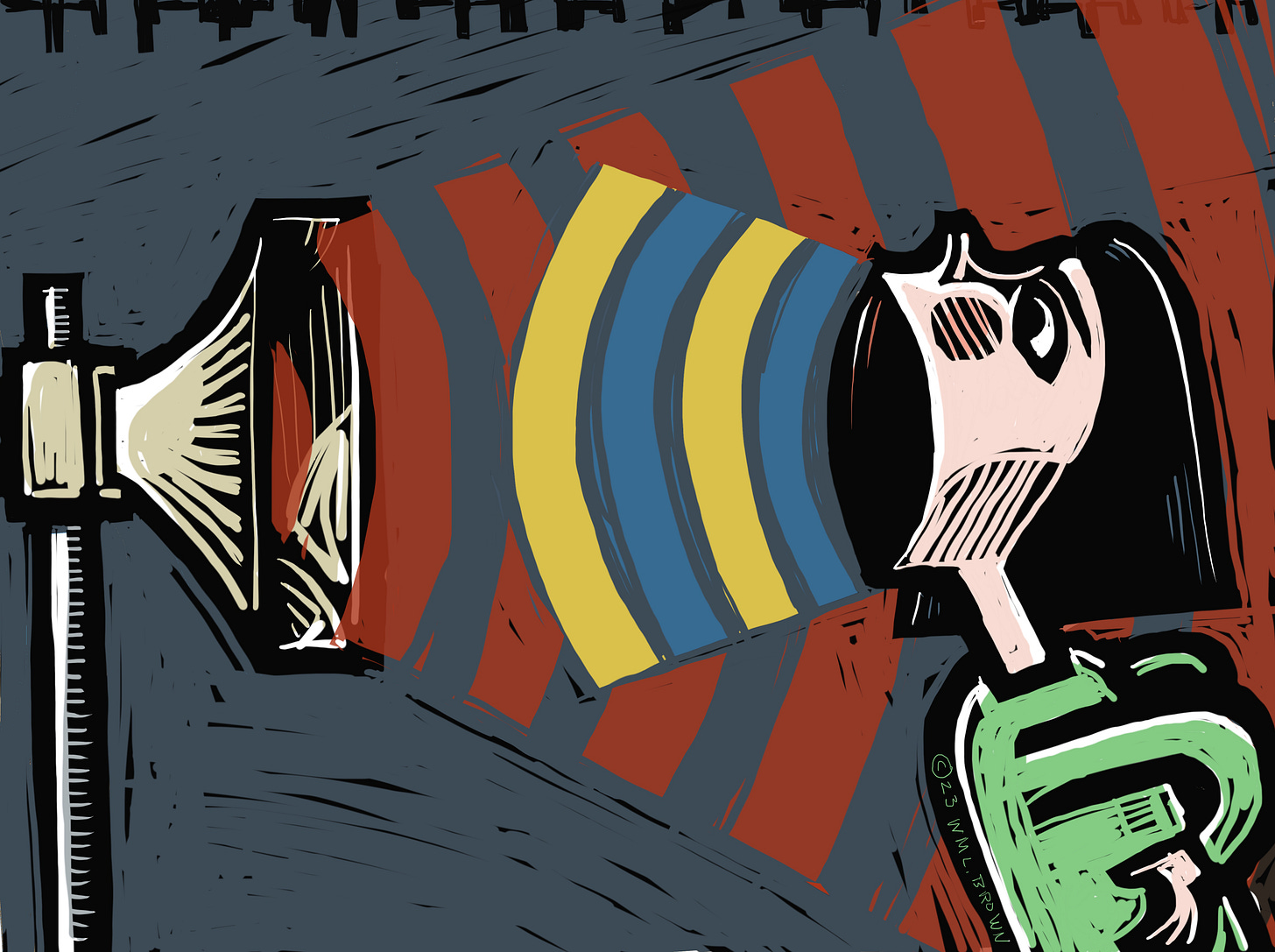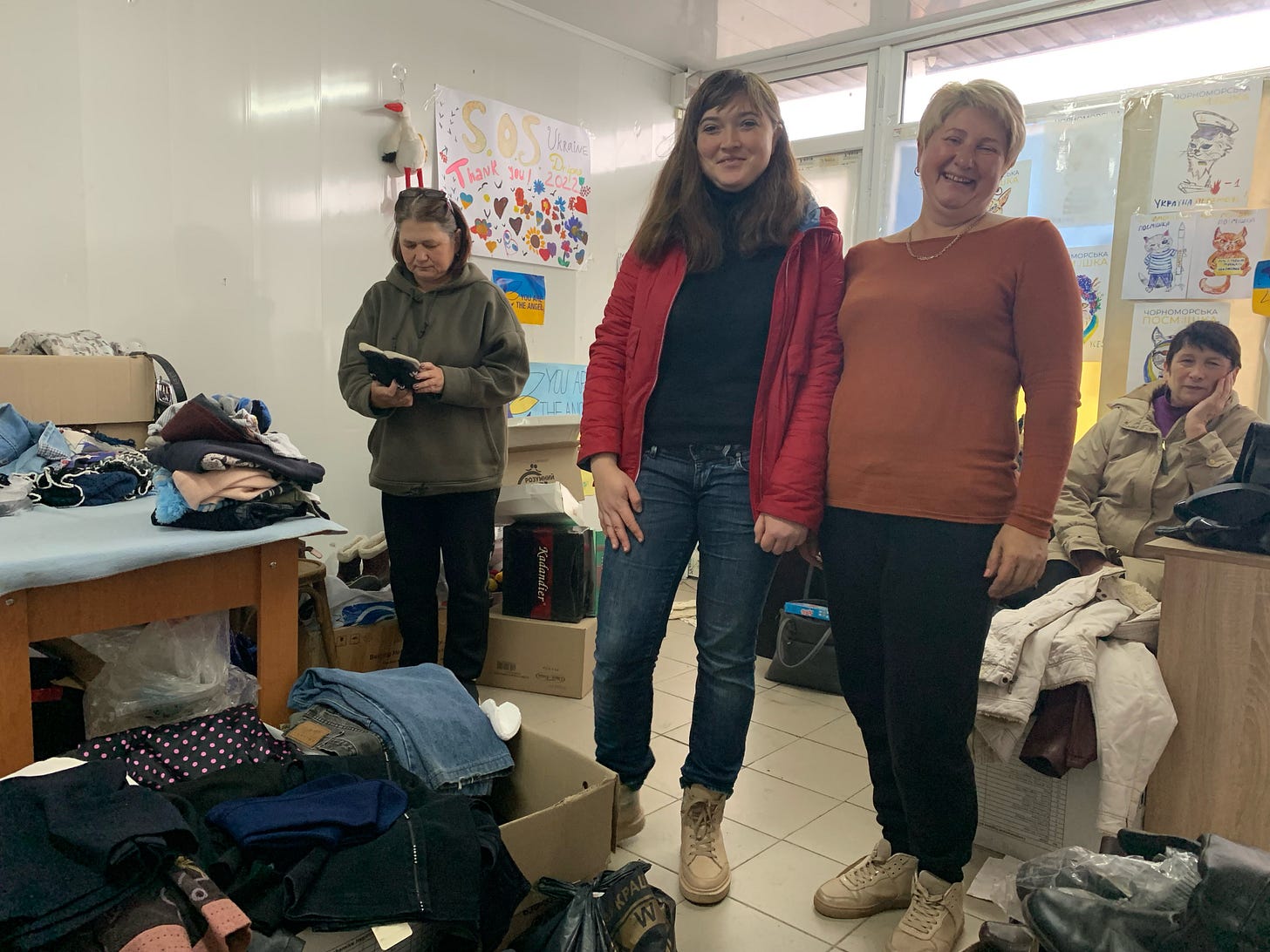Help Point
How to
Defiance - russian air raids are targeting Ukraine’s energy infrastructure. The invaders thought civilians suffering blackouts, cold and hunger would beg their government to make concessions. They were wrong. ©2023 William L. Brown
Welcome, new subscribers via Substack Read! Native Cpeaker is pleased to have been mentioned in the January 7 edition.
Native Cpeaker is usually about my Ukrainian friends and students or about myself, an American English teacher and illustrator displaced by the war. It doesn’t ordinarily focus on aid and fundraising.
However, this happens to be the post in which I answer the question posed last fall: “what’s the best way to help Ukraine?” The question came from readers, friends, and social media groups. Many, including myself, wanted to send THINGS, particularly warm things for the difficult Ukraine winter. It’s a natural response. But, …
The answer is: send money!
This is what volunteer activists, friends and students in Ukraine told me on my October/November visit.
Warm things: coats, gloves, blankets, boots and so forth are widely available in Ukraine. It is more efficient, cheaper and faster to buy them there with donated funds.
Also, Ukrainians’ needs change quickly. In October they needed warm clothes, by November they needed power banks and generators. Now, those latter items have flooded the market and are easily found.
A friend, for example, carried first aid supplies from the US to Ukraine early last fall. By the time she got them back to Ukraine—only a few weeks had passed—her group was in need of hand-warmers.
Send money to a group or person you trust. Sure, you can trust big-name non-profit organizations that provide aid. But, you can also trust them to spend a portion of your donation on their own salaries and overhead costs. I have other recommendations. They aren’t official non-profits, you won’t be able to write off your donation, but 100% of it will go to people in need.
Volunteer activists Ekaterina Minakova and Larissa Babij met for the first time in Kyiv, November 10, 2022.
• Ekaterina Minakova can funnel your funds to her community пункт допомоги [help point1] group in Dnipro. The help point is run by a volunteer community organization out of a small donated storefront. They provide free clothing, food, children’s toys, and other assistance to displaced people. Here is an interview I conducted at the help point in October with Ekaterina’s translation help.
If you wish to donate via Paypal or Wise, the information is on her online diary, which is a worth reading if you want an insight into current life in Ukraine.
There are about a thousand homeless Dnipro residents after the deadly January 14 missile strike on a Dnipro apartment building. This is a good time to make donations to the help point.
The Dnipro community Help Point. Third from the left is Natalya, the volunteer head of the effort, which is a neighborhood group with no government or NGO affiliation, sponsorship or funding. Natalya has been the head volunteer since it started immediately after the russian February 24 attack.
• These three recommendations are from a trusted source, Larissa Babij. They are her three favorite organizations. Larissa is the author of the A Kind of Refugee Substack. She is an American-Ukrainian living in Ukraine since 2005 who, after Feb 24, chose to remain in Ukraine to do what she can there.
Hero of Ukraine — building drones specially designed for Ukraine’s defense.
Community Self-Help — supporting the recovery and reintegration of veterans into civilian life (among other things).
Ukrainian Patriot — providing a variety of humanitarian aid to people and communities living in areas battered by the war.
• You can send money to me if any of the above are difficult to navigate and I will forward it. You can send via Paypal, Venmo, or if those don’t work for you, message or email me (put “Ukraine” in the subject line) and we’ll figure something out.
Also I can forward funds to my Ukrainian contacts who need it. Some are in Ukraine, some are refugees. The refugees I know happen to be in Germany.
Though refugees in Germany have basic care and potentially great opportunities, some are living on a shoestring in one of the most expensive countries on the planet while they wait for the bureaucratic process to move. They also have relatives back in Ukraine some of whom are are unemployed, underemployed or displaced.
Clearly there is a need, anything you can do will be helpful. Western money goes a long way, little is big. $20 buys a week’s worth of groceries. $8 buys a month of mobile phone service including unlimited streaming - much needed when four-hour power outages are a daily, sometimes twice-daily fact of life.
I’m still teaching English to Ukrainians, and it is rare for my students to have electricity. Usually, they log on via their phones and sit by candle or torchlight. Ukrainians are determined. Help them win if you can.
“Help point, пункт допомоги, is pronounced “punkt do-po-mochiy”, “punkt” meaning “point.” I first heard “punkt,” with the same meaning in Germany as I bounced about Europe following the February 24 attack. When I later encountered it as пункт in Ukraine, I assumed Ukrainian got it from German, but no, it has Latin roots and is a cousin of the English word “punctuation.” “Punkt” meaning “point” is also found in Polish and Scandinavian languages. It is, according to a couple of etymology sites, from medieval Latin punctuationem, "a marking with points in writing," or punctuat, “brought to a point.” This is one of many Ukrainian words that I’ve realized has Latin or Greek roots. How they got there, whether directly from the classical languages or via French, Italian, Spanish or English, I don’t know.




